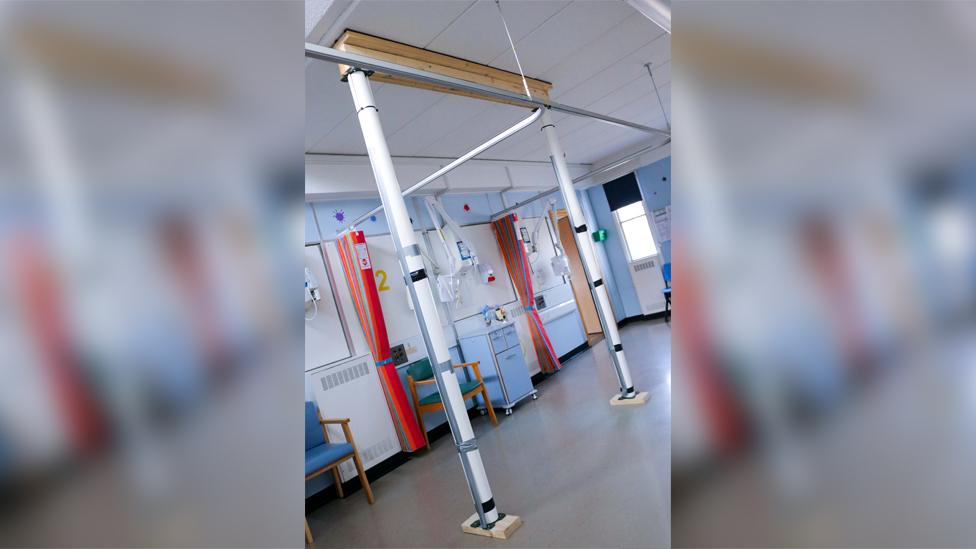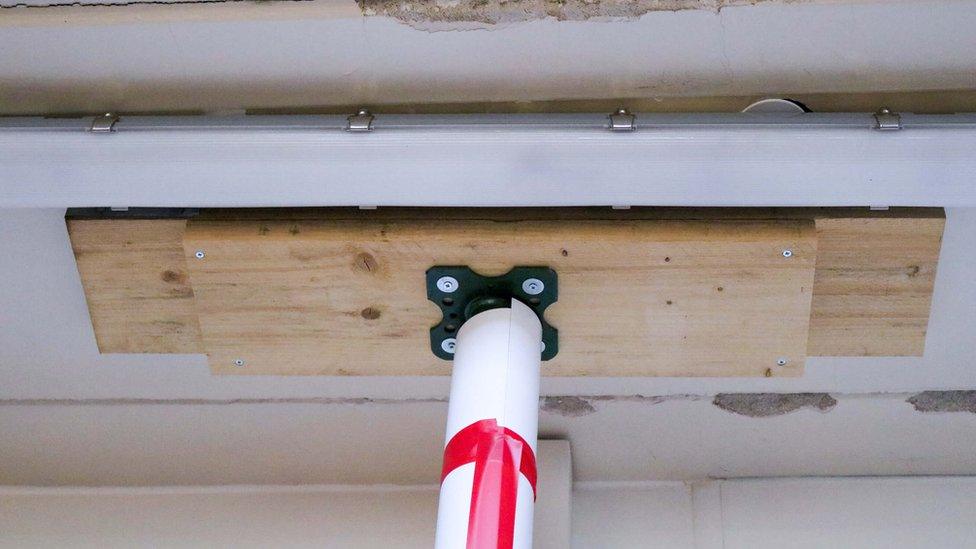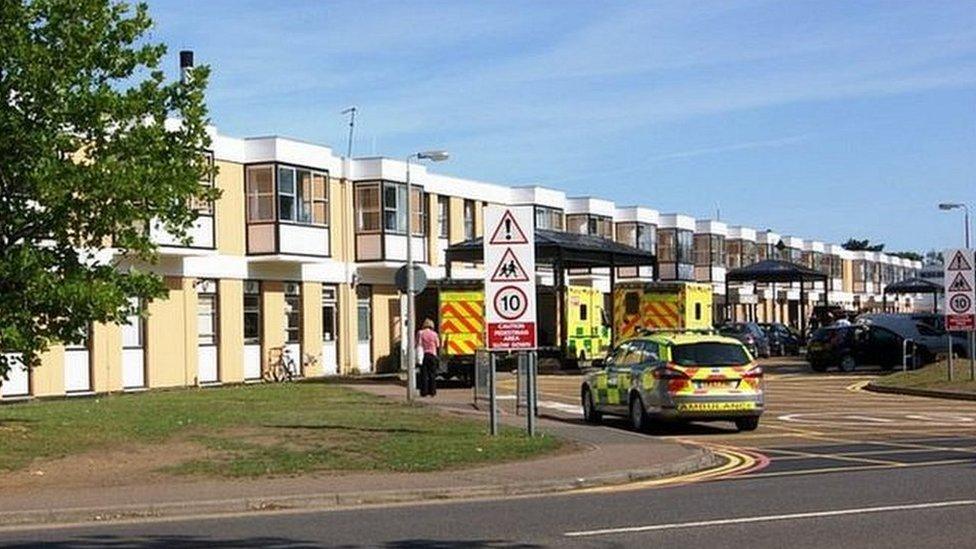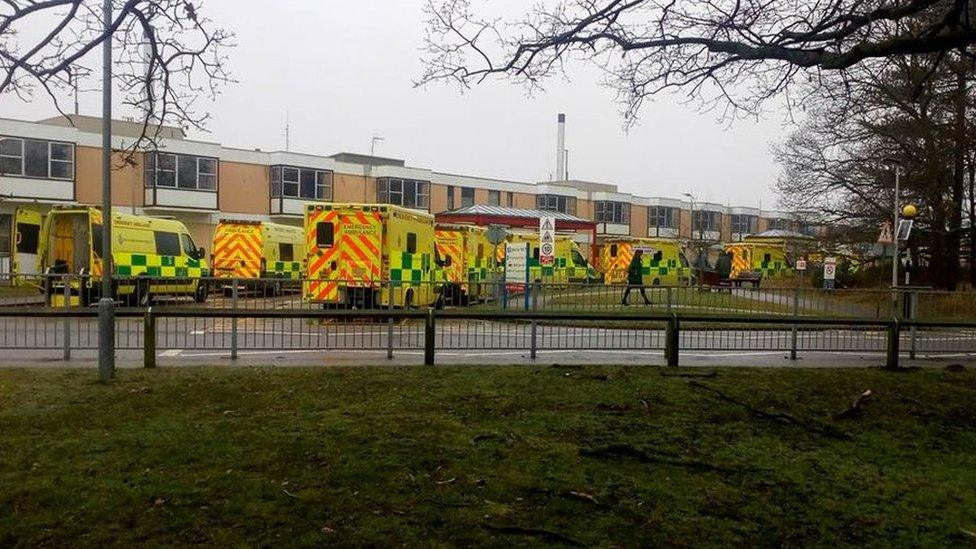Queen Elizabeth Hospital: Propped-up roof a 'direct risk to life'
- Published

A risk document from the hospital said its roofing was a risk to patient's lives
A hospital roof held up by props poses a "direct risk to the life and safety of patients", board papers said.
Despite the 131 supports at Norfolk's Queen Elizabeth Hospital (QEH), the "potential of catastrophic failure of the roof" remains, the papers revealed, external.
The government said the hospital had been given "over £20m to directly address the most immediate issues".
In a letter, leaked to the BBC, its deputy chief executive says "more than short-term fixes are needed".
Laura Skaife-Knight wrote to tell governors that the hospital trust was doing "all it can" to secure funding for a new hospital in King's Lynn.
The letter details the measures that have been taken to support the ageing roof, and says that since January, a further 50 props have been put up in 16 different areas.

There are 131 props in use across the hospital, including in areas such as critical care and maternity
It said the latest problems caused by the roofing had closed the hospital's critical care unit, though Ms Skaife-Knight wrote that it would soon reopen following a two-week closure for repairs.
The hospital trust was recently awarded £20.6m by the government to "fund the short-term fixes and improvements needed as surveys identify failings with the roof planks and rapid deterioration of the hospital's estate", said the letter.
Ms Skaife-Knight said that would "improve safety in the years to come "but would not "replace the roof planks or extend the life of the hospital beyond 2030".
The trust has bid for £165m over three years to help improve the safety of the hospital estate in the short-term. That included £45m in year one, towards which the £20.6m was awarded.

It would cost £554m over the next 10 years to make repairs to the existing hospital building, said its chief executive
However, Ms Skaife-Knight wrote that the trust had developed "a strong case" for a new hospital.
She said living with the risk at the current hospital would cost £554m over 10 years, while a new building would cost around £679m but come with additional benefits to meet "modern healthcare requirements".
Queen Elizabeth Hospital was not selected as one of 40 hospitals included in a £3.7bn building package announced by the government in October last year.
Ms Skaife-Knight told governors: "We know that there will be funding to build a further eight new or part-new hospitals by 2030 and that these will be announced in autumn 2021.
"QEH is doing all it can to position the trust to be one of these further eight hospitals."
A risk register within the board meeting agenda reads: "There is a direct risk of life and safety to patients, visitors and staff of the trust due to the potential of catastrophic failure of the roof structure due to structural deficiencies."
It said this was because the pre-cast concrete construction of the building was 40 years old, despite only being built to last 25 years, and rated the risk as "very high/extreme".
The Department of Health and Social Care said it recognised "the need to invest in improving health infrastructure across the country, including where trusts have identified significant issues", and cited the money awarded to the QEH already.
A spokesman said criteria for the further eight schemes to be included in the New Hospitals Programme would be announced shortly.
A spokeswoman for the hospital said: "We have a team permanently on site to systematically check and manage our buildings and to act on any work that might be needed, and we are treating patients safely, as normal."
She added that "a major incident" has not been declared and it has received "investment to support us with the maintenance of our estate, and we have an ongoing programme of estates work underway including monitoring and safety checking of the roof".
A meeting of the hospital's board of directors will be held on 7 April.

Find BBC News: East of England on Facebook, external, Instagram, external and Twitter, external. If you have a story suggestion email eastofenglandnews@bbc.co.uk
Related topics
- Published16 December 2020
